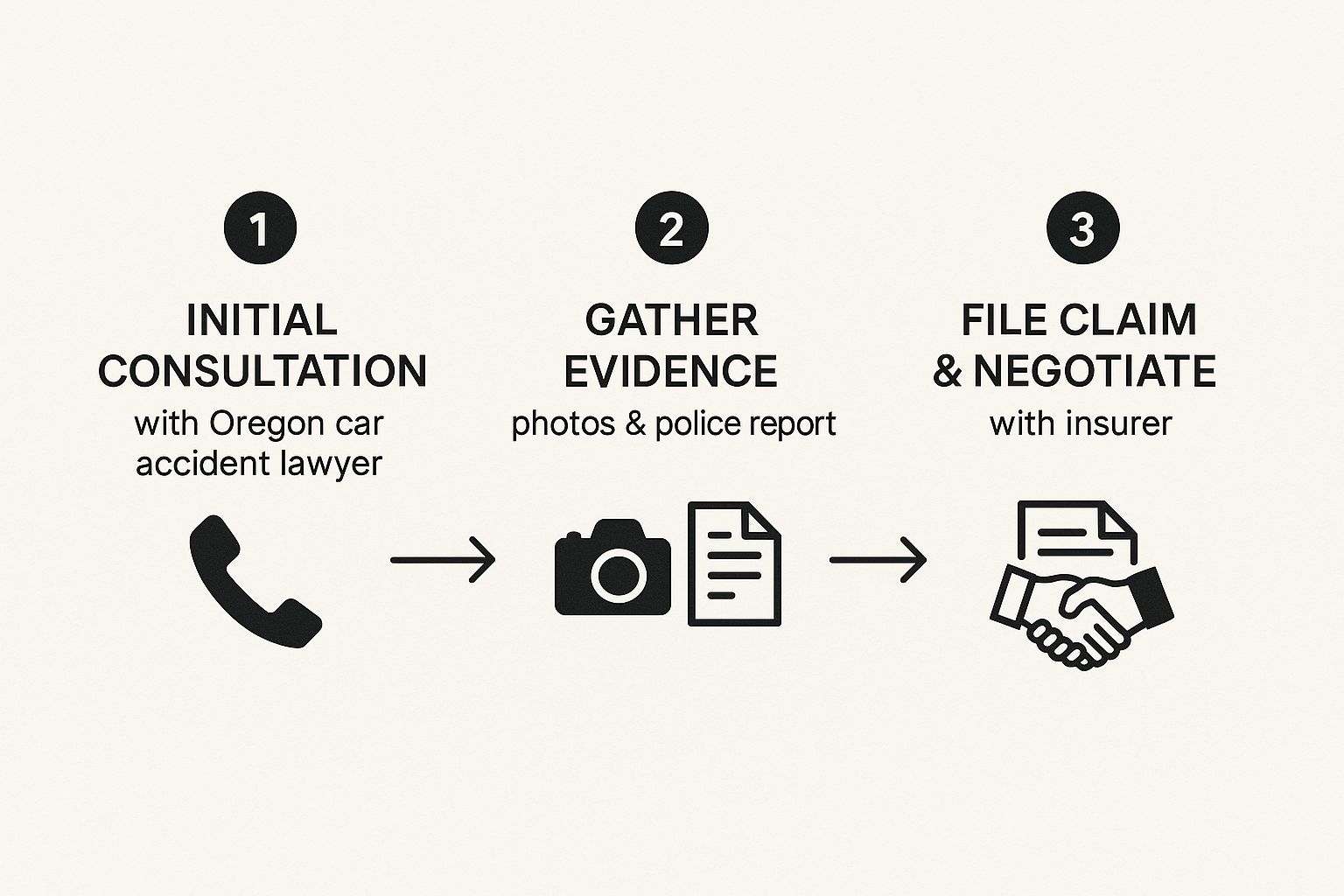Top Car Accident Lawyer Oregon | Find Your Expert Attorney
"I was satisfied once John Bell took over my case."
"Communication was always timely."
Top Car Accident Lawyer Oregon | Find Your Expert Attorney
When the unexpected happens and you're in a car wreck in Oregon, the next few minutes and hours are absolutely crucial. What you do right at the scene—from gathering evidence to getting medical help—can make or break your ability to get fair compensation later on.
What to Do Immediately After an Oregon Car Accident

The shock and adrenaline after a crash can easily cloud your thinking and even hide serious injuries. It’s tough, but keeping a level head and being methodical is your best strategy. The details you collect right here are priceless, and your smartphone is the best tool for the job.
Document Everything at the Scene
First things first: check on everyone's safety and dial 911 immediately. While you wait for help, turn your attention to documenting the scene. Pull out your phone and start taking photos and videos.
Get shots from every possible angle—show the positions of the cars, the damage to all vehicles involved, any skid marks on the road, and the general road conditions. Don’t forget to capture nearby traffic signs or signals.
You’ll want a mix of wide shots to capture the whole scene and tight close-ups on specific points of damage. This visual proof is often far more powerful than trying to recall details from memory and is exactly what a car accident lawyer in Oregon needs to piece together what happened.
Next, you'll need to swap information with the other driver. Don't leave without getting these essentials:
- Their full name and phone number
- The name of their insurance company and their policy number
- Their driver’s license and license plate numbers
- The make, model, and color of their vehicle
If anyone stopped to help or saw the crash, ask for their name and number. An independent witness can be incredibly valuable, especially if the other driver’s story starts to change down the road.
Critical Tip: Be very careful with your words. When talking to the police or the other driver, just state the facts. Avoid phrases like "I'm so sorry" or "I think I might have..." because they can easily be twisted into an admission of fault.
Put Your Health and Your Case First
Even if you think you’re okay, get checked out by a doctor as soon as possible. The adrenaline of the moment can mask injuries like whiplash, concussions, or even internal bleeding, which might not show symptoms for hours or days.
Waiting to see a doctor does two things—it puts your health at risk and gives the insurance company an opening to claim your injuries aren't from the crash.
That first medical visit creates a vital record, directly linking your injuries to the accident. This is the bedrock of a personal injury claim. A common mistake I see people make is trying to tough it out or downplaying their pain at the scene. Be honest with paramedics and doctors about every single thing that hurts, no matter how small it seems. It's not just for your health; it's about protecting your legal rights.
Why You Need an Advocate in Oregon’s At-Fault System
Oregon is what's known as an "at-fault" state when it comes to car accidents. On paper, it seems straightforward—whoever caused the wreck pays for the damages. The reality, however, is a whole different story.
Proving fault is almost never cut and dry, and this is where the fight with the insurance companies really begins. Their primary goal isn't to make sure you get fair compensation; it’s to protect their profits. An insurance adjuster is trained to pay out as little as possible, and without an experienced car accident lawyer in Oregon in your corner, you're walking into a negotiation you're not equipped to win.
The Insurance Adjuster's Playbook
Don't be surprised if the other driver's insurance company calls you almost immediately after the crash. They’ll often sound concerned and helpful, but this is a calculated approach designed to undermine your claim right out of the gate.
A classic move is asking for a recorded statement. They’ll frame it as a routine formality, but every word you say is being scrutinized. A simple, polite "I'm feeling okay" can be twisted later to argue your injuries aren't severe, even if serious symptoms like whiplash don't show up for a few days.
Another red flag is the quick, lowball settlement offer. When you've got medical bills and car repair costs piling up, fast cash can sound mighty tempting. But these initial offers are almost always a fraction of what your claim is actually worth, and they certainly don't account for long-term consequences.
A fast settlement offer from an insurer is a major red flag. They are betting you don't know the true value of your claim, including future medical treatments, lost earning capacity, and non-economic damages like pain and suffering.
How a Lawyer Levels the Playing Field
Hiring an attorney fundamentally changes the game. Right away, they become the sole point of contact for the insurance company, effectively shielding you from their pressure tactics and manipulative questions. Your lawyer's first priority is to launch an independent investigation to build an airtight case for who was at fault.
This isn't just a paperwork exercise. It's a deep dive that involves:
- Gathering Critical Evidence: Pulling the official police report, finding and interviewing any witnesses who saw what happened, and securing traffic or surveillance camera footage before it gets erased.
- Calculating Your True Damages: Collaborating with medical and financial experts to paint a full picture of your losses—not just current bills, but future medical care, lost earning potential, and the real cost of your pain and suffering.
- Negotiating from a Position of Strength: Armed with concrete evidence, your lawyer will present a comprehensive demand package to the insurer, forcing them to the table for a serious negotiation.
The numbers alone show how often this happens. In 2022, there were 45,070 reported vehicle collisions in Oregon. In our fault-based system, the insurance company isn't your guide; they're your adversary. A lawyer is the only person in this process who is 100% dedicated to protecting your interests. You can find more detailed insights on Oregon's fault-based system from Jonathan M. Friedman, PC. Going it alone means facing a complex legal and financial battle with the odds stacked against you.
How to Find the Right Oregon Car Accident Lawyer
After a wreck, the thought of finding a lawyer can be daunting. You're dealing with injuries, a damaged vehicle, and mounting bills. But here's the thing: you don't need just any lawyer. You need an advocate who lives and breathes Oregon car accident law.
A general practice attorney might be great for writing a will, but they likely don't know the specific tactics insurance adjusters use right here in Portland or Salem. Your search needs to be focused from the very beginning on finding someone with a proven playbook for winning these specific types of cases.
Starting Your Search: Vetting Potential Attorneys
The first step is building a shortlist. Start by looking for attorneys whose websites and client success stories are filled with car accident cases. Don't just rely on the testimonials they feature on their own site; dig into independent review platforms like Avvo, Google, and Yelp to get a more balanced picture. Are former clients consistently praising the firm for their communication and the results they achieved? That's a great sign.
Once you have a few names, it's time to put on your investigator hat. A law firm's online footprint tells a story. Look for these key signals:
- A Clear Focus: Does their website scream "car accidents," or is it one of a dozen different things they do? A dedicated practice means they're dealing with these cases day in and day out.
- Deep Local Roots: An attorney who knows the local court system, the judges, and even the lawyers on the other side has a home-field advantage you can't overstate.
- Peer-Reviewed Credentials: Honors like "Super Lawyers" or memberships in trial lawyer associations aren't just vanity plaques. They show that other legal professionals respect their skill and integrity.
This visual guide gives you a bird's-eye view of how a car accident claim typically unfolds, from that first phone call to the final resolution.

It’s a methodical process, and having an experienced guide is essential for navigating each stage successfully.
The Initial Consultation: Your Interview with Them
Think of the free consultation as your chance to interview the lawyer, not the other way around. This meeting is about more than just legal credentials; it’s about finding a partner you trust and feel comfortable with during a stressful time.
Come prepared. Bring everything you have—the police report, photos from the scene, medical bills, and your own notes. A good car accident lawyer in Oregon will appreciate your organization and will be ready to answer tough questions.
The questions you ask are critical for making an informed choice. This table breaks down what you should ask and why each question is so important.
Key Questions to Ask a Potential Car Accident Lawyer
Use this checklist during your initial consultations to vet and compare different attorneys effectively.
| Experience & Focus | How many car accident cases like mine have you personally handled in the last year? | This confirms their recent, relevant experience, not just what the firm handled a decade ago. It shows they are up-to-date. |
| Case Management | Who will be my day-to-day contact? Will I be working with you, a junior lawyer, or a paralegal? | You need to know who is managing your case and if you'll have direct access to the lead attorney when it's needed. |
| Communication | What is your policy for returning calls and emails? How often can I expect case updates? | Sets clear expectations from the start and helps you avoid the frustration of feeling ignored or left in the dark. |
| Strategy & Outlook | Based on what you know so far, what are the potential strengths and weaknesses of my case? | A good lawyer will give you an honest, realistic assessment, not just rosy promises. They should be transparent. |
| Fees & Costs | Can you explain your contingency fee percentage and what case costs I might be responsible for? | This ensures there are no financial surprises. You need to fully understand the fee agreement before you sign anything. |
Asking these direct questions helps you cut through the sales pitch and get to the core of how the firm operates.
At the end of the day, trust your instincts. The legal expertise is non-negotiable, but so is feeling seen and respected. If you leave a consultation feeling rushed, dismissed, or more confused than when you walked in, that’s a major red flag. Learning more about the role of an auto accident lawyer can give you a better framework for what to expect. The right attorney-client relationship is a partnership, and you deserve to feel like your case is their top priority.
Handling Complex Accident Scenarios in Oregon

While some car accidents are straightforward, many are a tangled mess of complex factors that make proving who’s at fault a serious challenge. We're not talking about simple fender-benders here. These are the crashes that demand a deep, investigative dive to get to the truth.
This is precisely where having a seasoned car accident lawyer in Oregon makes all the difference. They know how to dig much deeper than the initial police report to build a case that can withstand the aggressive tactics insurance companies love to use, especially when things get complicated with distracted driving or hit-and-runs.
Uncovering Evidence in Distracted Driving Cases
Distracted driving has become a dangerously common cause of devastating accidents. Proving it happened can be tough, but a skilled attorney knows exactly where to find the digital breadcrumbs that tell the real story.
After a crash, your lawyer can legally subpoena the at-fault driver's cell phone records. These aren't just call logs; they create a detailed timeline of what the driver was doing right before the collision. This can include:
- Text messages they sent or read just moments before impact.
- Data usage that points to scrolling through social media or using other apps.
- GPS data that might contradict their version of the story.
This kind of digital evidence can completely change the game, turning a "he-said, she-said" situation into a clear-cut case of negligence. It provides the hard proof needed to show the other driver simply wasn't paying attention, and that their inattention is what caused your injuries.
Navigating the Aftermath of a Hit-and-Run
A hit-and-run is one of the most infuriating and stressful experiences you can have. The other driver flees the scene, leaving you injured, with a damaged car, and feeling like there's no one to hold accountable.
Don't give up hope. A good attorney will launch an immediate investigation to track down the driver. This often involves canvassing the area for security camera footage from nearby businesses or homes, finding and interviewing witnesses who might have jotted down a partial license plate, and coordinating with law enforcement.
Even if the hit-and-run driver is never found, your case isn't necessarily over. A skilled lawyer will pivot and examine your own insurance policy to help you file an Uninsured Motorist (UM) claim, which can cover your medical bills, lost income, and other damages.
Sometimes, an accident involves several different people, which can really blur the lines of responsibility. For instance, what if a distracted driver causes another car to swerve and hit you? In that scenario, both of the other drivers could share the blame. Knowing how to sort through these multi-party accidents is critical. You can learn more about how fault can be assigned to more than one party by reading our detailed article on third-party liability.
Making Sense of Attorney Fees and Your Compensation

One of the biggest worries that stops people from calling a lawyer after a crash is the cost. Let's clear that up right away. You shouldn't have to worry about paying for legal help when you're trying to recover.
Thankfully, the way personal injury law works is designed for exactly this situation.
Almost every reputable car accident lawyer in Oregon works on what’s called a contingency fee basis. You’ve probably heard the phrase "no win, no fee"—this is what they're talking about. It simply means the lawyer's payment is contingent on winning your case, either through a settlement or a court verdict.
If for some reason your case isn't successful, you won't owe a dime in attorney fees. This system gives you access to high-quality legal help without paying anything upfront, which is crucial when you're up against massive insurance companies.
How Contingency Fees Actually Work
When you decide to hire a car accident lawyer in Oregon, you'll go over and sign a fee agreement. This document spells out the exact percentage of the final settlement that will cover their fee.
Typically, this percentage is between 33% and 40%. The rate might be lower if the case settles quickly and higher if it has to go all the way to a trial, which involves a massive amount of additional work.
It's also important to ask about case expenses. Building a strong case costs money. These are the funds needed to pay for things like:
- Pulling official police reports and all your medical records
- Hiring expert witnesses (like an accident reconstruction specialist)
- Paying court filing fees or the cost of taking depositions
Most firms front these costs for you and then get reimbursed from the settlement once the case is over. Make sure you ask for a clear breakdown of how this works during your first meeting so there are no surprises.
Key Takeaway: A contingency fee means your lawyer is just as invested in a successful outcome as you are. Their goals are your goals: to get you the best possible compensation.
What Kind of Compensation Can You Actually Get?
A huge part of your lawyer's job is figuring out what your claim is truly worth. It’s a lot more than just adding up the hospital bills you have so far. Generally, the compensation you can fight for falls into two buckets.
Economic Damages
These are the concrete financial losses you can prove with receipts and records. Think of things like all your medical treatments (past and future), lost income from being out of work, and even the loss of future earning ability if your injuries will affect your career.
Non-Economic Damages
These losses are just as real but don't come with a price tag. This category covers your physical pain and suffering, emotional trauma, the loss of enjoyment of your life, and other psychological impacts the crash has had on you.
Figuring out a fair number for all these damages is a complicated process. An insurance adjuster will almost certainly try to downplay your non-economic damages. Having an experienced advocate who knows how to properly value every part of your claim is the only way to make sure you don't accept a lowball offer.
To see how all these pieces fit together, you can read our detailed guide to the car accident settlement process.
Navigating the Aftermath on Oregon's Roads
Let's be honest—driving in Oregon has its risks. The numbers don't lie, and they paint a pretty clear picture of why having the right legal help after a crash isn't just a good idea, it's often essential.
When the stakes are high, you can bet the insurance company will be playing hardball. Their goal is simple: pay out as little as possible. The statistics below aren't here to scare you, but to show you exactly what you're up against and why a dedicated car accident lawyer in Oregon can be your most important partner.
A Closer Look at Portland's Roads
Oregon consistently ranks as one of the more dangerous states for drivers, and the statistics for traffic-related deaths often edge out the national average. Portland, in particular, can be a tough place to drive.
The city sees an estimated 700 serious injuries from traffic accidents every single year. Back in 2021, Portland recorded 64 traffic fatalities, which was a startling 18.5% jump from the average of the five years prior. If you want to dig deeper into these numbers, you can explore regional driving risk statistics to get the full picture.
This isn't just data; it's the reality that people face every day. A serious collision is so much more than a wrecked car—it can mean a lifetime of medical treatments or, in the worst cases, a wrongful death claim.
Fighting for what's right in these situations is a far cry from just filling out some forms. It requires a sharp legal strategy designed to push back against insurance adjusters whose primary job is to protect their company’s profits, not your family's future.
A seasoned lawyer knows how to use this context to tell a powerful story. They connect the severity of the crash to the real-world compensation you'll need for ongoing care, lost wages, and the profound personal toll it takes. Their job is to make sure your voice is heard and that your claim truly accounts for the long-term impact the accident will have on your life.
Answering Your Top Oregon Car Accident Questions
After a car crash, your head is probably swimming with questions. It's a stressful, confusing time, and getting clear answers is the first step toward feeling in control again. Let's tackle some of the most common concerns we hear from people just like you.
"How Long Do I Really Have to File a Claim in Oregon?"
This is one of the most critical questions, and the answer is unforgiving: time is not on your side. In Oregon, the legal deadline, known as the statute of limitations, is typically two years from the date of your injury for most car accident claims.
If the accident tragically resulted in a death, that window is extended to three years for a wrongful death claim.
Don't brush this off. If you miss that deadline, your right to seek compensation is almost certainly gone forever. This is a huge reason to get a lawyer involved early. They manage these timelines so your case doesn't get thrown out on a technicality.
"What if the Accident Was Partially My Fault?"
It's a common misconception that if you share even a little bit of the blame, you can't recover anything. Thankfully, that’s not how it works in Oregon.
Our state operates under a modified comparative negligence rule. In simple terms, this means you can still get compensation as long as you were not more at fault than the other driver. Your responsibility must be 50% or less.
Your final compensation will then be reduced by whatever percentage of fault is assigned to you.
Here’s a real-world example: Say you’re awarded $100,000 for your injuries, but a jury decides you were 20% at fault for the crash. Your final award would be reduced by that 20% ($20,000), so you would receive $80,000. A skilled attorney's job is to build a case that minimizes your percentage of fault as much as possible.
"The Insurance Company Made an Offer. Should I Just Take It?"
You should absolutely talk to a lawyer before you even think about accepting an initial offer. Insurance adjusters are trained to protect their company's bottom line, which means settling claims as quickly and cheaply as they can.
That first offer is almost never their best one. It's a starting point designed to seem tempting enough for you to sign away your rights before you know what your claim is truly worth.
An experienced lawyer knows how to calculate the full value of your claim. This isn't just about current medical bills; it includes future treatments, lost income, diminished earning capacity, and the very real impact of your pain and suffering. They can then negotiate from a position of strength to get you a settlement that is actually fair.
Navigating the legal maze after a car accident in Oregon is tough, but you don't have to do it alone. The team at Bell Law has the experience to answer your questions and fight for the compensation you need to move forward. Reach out for a free, no-pressure consultation at https://www.belllawoffices.com.
Disclaimer: The information on this page is provided for general informational purposes only and is not legal advice. Reading this content does not create an attorney-client relationship. For advice about your specific situation, please contact a licensed attorney.







